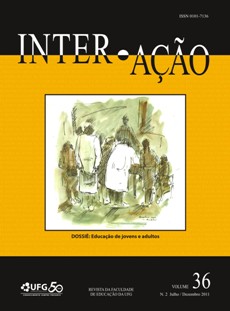A EDUCAÇÃO DE JOVENS E ADULTOS NO SÉCULO XXI – DA ALFABETIZAÇÃO AO ENSINO PROFISSIONAL
DOI :
https://doi.org/10.5216/ia.v36i2.16713Mots-clés :
Educação de jovens e adultos, Políticas nacionais, Educação profissionalRésumé
Este artigo apresenta uma análise da Educação de Jovens e Adultos, partindo das ações implementadas pelo governo federal para esta modalidade de ensino, no contexto da primeira década do Século XXI. O estudo prioriza o diálogo com ações direcionadas inicialmente para a alfabetização, especialmente o Programa Brasil Alfabetizado, chegando a ações voltadas para educação de jovens e adultos trabalhadores, com foco no Proeja no IFG em Goiânia. O indicativo da análise destas ações e programas é de que há uma ampliação do escopo de propostas para escolarização dos jovens e adultos, não se restringindo ou focalizando apenas em alfabetização, tendendo a buscar uma aproximação entre a educação básica e a educação profissional. Todavia, as iniciativas ainda não se constituem em política pública que envolva a população em larga escala, nem mesmo impactam uma visão, que está no senso comum, da pouca necessidade de escolarização dos jovens e adultos, revelando a falta de consciência da importância de uma cultura letrada no país e da educação como direito de todos.Téléchargements
Téléchargements
Publié-e
Comment citer
Numéro
Rubrique
Licence
A Inter-Ação utiliza como base para transferência de direitos a licença Creative Commons Attribution 4.0 para periódicos de acesso aberto (Open Archives Iniciative - OAI). Por acesso aberto entende-se a disponibilização gratuita na Internet, para que os usuários possam ler, baixar, copiar, distribuir, imprimir, pesquisar ou referenciar o texto integral dos documentos, processá-los para indexação, utilizá-los como dados de entrada de programas para softwares, ou usá-los para qualquer outro propósito legal, sem barreira financeira, legal ou técnica.
Autores que publicam neste periódico concordam com os seguintes termos:
1) Autores mantém os direitos autorais e concedem à revista o direito de primeira publicação, com o trabalho simultaneamente licenciado sob a Licença Creative Commons Attribution que permite o compartilhamento do trabalho com reconhecimento da autoria e publicação inicial nesta revista.
2) Autores têm autorização para assumir contratos adicionais separadamente, para distribuição não-exclusiva da versão do trabalho publicada nesta revista (ex.: publicar em repositório institucional ou como capítulo de livro), com reconhecimento de autoria e publicação inicial nesta revista.
3) Autores têm permissão e são estimulados a publicar e distribuir seu trabalho online (ex.: em repositórios institucionais ou na sua página pessoal) a qualquer ponto antes ou durante o processo editorial, já que isso pode gerar alterações produtivas, bem como aumentar o impacto e a citação do trabalho publicado.















